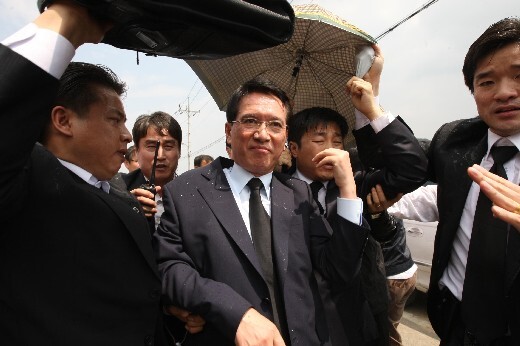hankyoreh
Links to other country sites 다른 나라 사이트 링크
Many say tragedy began with Blue House’s intention to stop Roh’s political revival

“They tortured him, dragging it on for so long.”
This is from the fulminations of a ruling Grand National Party (GNP) figure over the suicide of former President Roh Moo-hyun on Saturday. These words demonstrate a sense of shame regarding Roh’s subjection to uncalled-for pressure as the “audit situation” dragged on for some ten months from the time the National Tax Service had started its audit of Taekwang Industrial Chairman Park Yeon-cha in late July 2008 through the prosecutors‘ investigation that began in November.
Cheong Wa Dae (the presidential office in South Korea or Blue House) officials are doing their utmost to avoid any reference to analyses connecting Roh’s death with the tax audit or the prosecutors’ investigation. But the general view among observers is that the National Tax Service’s audit of Park Yeon-cha, which set in motion a sequence of events that have shaken ruling and opposition party figures, including former President Roh, is unlikely to have taken place without some Cheong Wa Dae involvement.
“In some respects, the National Tax Service’s audit of Park Yeon-cha began out of a determination to prevent any possible resumption of former President Roh Moo-hyun’s political activity,” said one pro-Lee Myung-bak Grand National Party lawmaker.
When the audit began in late July 2008, President Lee was looking for a turnaround while amid the quagmire of U.S. beef imports and candlelight vigil demonstrations. Roh had been relatively active, and had gained popularity upon his return to Bongha Village and formation of an Internet discussion site called “Democracy 2.0.” Cheong Wa Dae officials at the time remarked that Roh’s activities appeared “worrisome,” and warned about the possibility that Roh could become the center of “anti-Lee” activity. The general analysis among political figures is that this atmosphere provides the context for the Cheong Wa Dae’s offensive in May with a probe into Roh’s possession of classified records and a tax audit of Park Yeon-cha.
“Even during the time of the presidential transition, just after the presidential election, there was a strong sense that it might be okay to ‘scare’ Roh with allegations of corruption, but that he should not be regarded as a direct target,” said one ruling party official. “However, after the new administration was launched, comments such as ‘lost decade’ and ‘purging leftists’ gained force, Roh became a direct target as the momentum grew,” the official added.
“Then National Tax Service Commissioner Han Sang-ryule planned the Park Yeon-cha audit with an eye on reappointment, and the audit meshed with the Cheong Wa Dae’s intent to weaken Roh,” the official explained.
Han is known to have directly reported the findings of the audit to President Lee in November, which provides some evidence of how interested President Lee and the Cheong Wa Dae were in the explosiveness of the “Park Yeon-cha list.”
Attempting to dismiss speculation of any Cheong Wa Dae involvement with the National Tax Service commissioner, a Cheong Wa Dae secretary said, “From what I know, President Lee received a report on the National Tax Service’s audit findings in November of last year and directed them that ‘there may be some of our people mixed up in this, but you are to do things according to the rules.’” The secretary added, “It all went according to the law, and without intention of targeting or protecting specific individuals,”
Please direct questions or comments to [englishhani@hani.co.kr]
Editorial・opinion
![[Column] Park Geun-hye déjà vu in Yoon Suk-yeol [Column] Park Geun-hye déjà vu in Yoon Suk-yeol](https://flexible.img.hani.co.kr/flexible/normal/500/300/imgdb/original/2024/0424/651713945113788.jpg) [Column] Park Geun-hye déjà vu in Yoon Suk-yeol
[Column] Park Geun-hye déjà vu in Yoon Suk-yeol![[Editorial] New weight of N. Korea’s nuclear threats makes dialogue all the more urgent [Editorial] New weight of N. Korea’s nuclear threats makes dialogue all the more urgent](https://flexible.img.hani.co.kr/flexible/normal/500/300/imgdb/original/2024/0424/7317139454662664.jpg) [Editorial] New weight of N. Korea’s nuclear threats makes dialogue all the more urgent
[Editorial] New weight of N. Korea’s nuclear threats makes dialogue all the more urgent- [Guest essay] The real reason Korea’s new right wants to dub Rhee a founding father
- [Column] ‘Choson’: Is it time we start referring to N. Korea in its own terms?
- [Editorial] Japan’s rewriting of history with Korea has gone too far
- [Column] The president’s questionable capacity for dialogue
- [Column] Are chaebol firms just pizza pies for families to divvy up as they please?
- [Column] Has Korea, too, crossed the Rubicon on China?
- [Correspondent’s column] In Japan’s alliance with US, echoes of its past alliances with UK
- [Editorial] Does Yoon think the Korean public is wrong?
Most viewed articles
- 1[Guest essay] The real reason Korea’s new right wants to dub Rhee a founding father
- 2Why Korea shouldn’t welcome Japan’s newly beefed up defense cooperation with US
- 3[Column] ‘Choson’: Is it time we start referring to N. Korea in its own terms?
- 4New AI-based translation tools make their way into everyday life in Korea
- 5[Column] Park Geun-hye déjà vu in Yoon Suk-yeol
- 6Senior doctors cut hours, prepare to resign as government refuses to scrap medical reform plan
- 7Opposition calls Yoon’s chief of staff appointment a ‘slap in the face’
- 8Will NewJeans end up collateral damage in internal feud at K-pop juggernaut Hybe?
- 9Terry Anderson, AP reporter who informed world of massacre in Gwangju, dies at 76
- 10Thursday to mark start of resignations by senior doctors amid standoff with government